

World Anti-Doping Agency. Initially funded by the International Olympic Committee, WADA now receives half of its budgetary requirements from them, with the other half coming from various governments throughout the world.
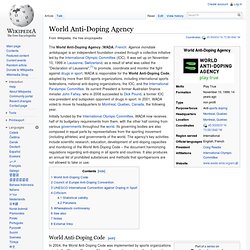
Its governing bodies are also composed in equal parts by representatives from the sporting movement (including athletes) and governments of the world. The agency's key activities include scientific research, education, development of anti-doping capacities and monitoring of the World Anti-Doping Code – the document harmonizing regulations regarding anti-doping in all sports and countries. It also produces an annual list of prohibited substances and methods that sportspersons are not allowed to take or use. World Anti-Doping Code[edit] Revolutionary Armed Forces of Colombia. The Revolutionary Armed Forces of Colombia—People's Army (Spanish: Fuerzas Armadas Revolucionarias de Colombia—Ejército del Pueblo, FARC–EP and FARC) are an irregular military organization involved in the continuing Colombian armed conflict since 1964.[9][10][11][12] The FARC-EP have a claim to be an army of peasants Marxist-Leninists with a political platform of agrarianism and anti-imperialism inspired by Bolivarianism.
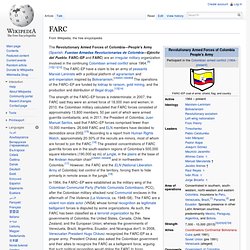
Triad (underground society) Triad refers to the many branches of Chinese (Cantonese) transnational organized crime organizations based in Hong Kong, Macau, Taiwan and also in countries with significant Chinese populations, such as the Philippines, Indonesia, Malaysia, Singapore, Siam (now Thailand), Japan, the United States, Canada, Australia, New Zealand and the United Kingdom.
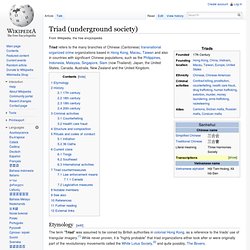
The term "Triad" was assumed to be coined by British authorities in colonial Hong Kong, as a reference to the triads' use of triangular imagery.[1] While never proven, it is "highly probable" that triad organizations either took after or were originally part of the revolutionary movements called the White Lotus Society,[2] and quite possibly, The Boxers.
Sicilian Mafia. Mafia is a type of organized crime syndicate that primarily practices protection racketeering — the use of violent intimidation to manipulate local economic activity, especially illicit trade; secondary activities may be practiced such as drug-trafficking, Loan sharking and fraud.
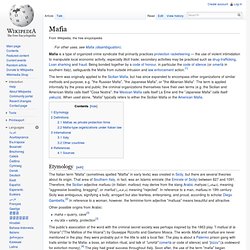
Being bonded together by a code of honour, in particular the code of silence (or omertà in southern Italy), safeguards the Mafia from outside intrusion and law enforcement action.[1] The term was originally applied to the Sicilian Mafia, but has since expanded to encompass other organizations of similar methods and purpose, e.g.
Yakuza. Yakuza (ヤクザ?
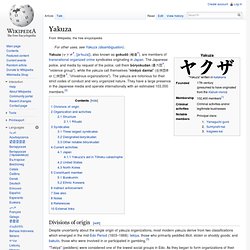
, [jaꜜkuza]), also known as gokudō (極道?) , are members of transnational organized crime syndicates originating in Japan. The Japanese police, and media by request of the police, call them bōryokudan (暴力団? , "violence group"), while the yakuza call themselves "ninkyō dantai" (任侠団体 or 仁侠団体? , "chivalrous organizations"). Divisions of origin[edit] Despite uncertainty about the single origin of yakuza organizations, most modern yakuza derive from two classifications which emerged in the mid-Edo Period (1603–1868): tekiya, those who primarily peddled illicit, stolen or shoddy goods; and bakuto, those who were involved in or participated in gambling.[3] Sinaloa Cartel. Background[edit] City of Culiacán, Sinaloa, home base of the Cartel Pedro Avilés Pérez was a pioneer drug lord in the Mexican state of Sinaloa in the late 1960s.

He is considered to be the first generation of major Mexican drug smugglers of marijuana who marked the birth of large-scale Mexican drug trafficking.[18] He also pioneered the use of aircraft to smuggle drugs to the United States.[19] Second generation Sinaloan traffickers such as Rafael Caro Quintero, Ernesto Fonseca Carrillo, Miguel Ángel Félix Gallardo and Avilés Pérez' nephew Joaquín 'El Chapo' Guzmán[20] would claim they learned all they knew about narcotrafficking while serving in the Avilés organization. Miguel Ángel Félix Gallardo, who eventually founded the Guadalajara Cartel, was arrested in 1989 and, while incarcerated, he remained one of Mexico's major traffickers, maintaining contact with his organization via mobile phone until he was transferred to a new maximum security prison in the 1990s.
Tibetan independence movement. The Tibetan independence movement is a movement for the independence of Tibet and the political separation of Tibet from the People's Republic of China.
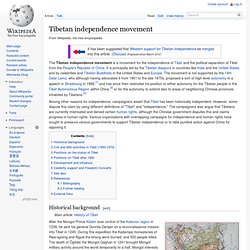
It is principally led by the Tibetan diaspora in countries like India and the United States, and by celebrities and Tibetan Buddhists in the United States and Europe. The movement is not supported by the 14th Dalai Lama, who although having advocated it from 1961 to the late 1970s, proposed a sort of high-level autonomy in a speech in Strasbourg in 1988,[1] and has since then restricted his position to either autonomy for the Tibetan people in the Tibet Autonomous Region within China,[2] or for the autonomy to extend also to areas of neighboring Chinese provinces inhabited by Tibetans.[3] Among other reasons for independence, campaigners assert that Tibet has been historically independent.
However, some dispute this claim by using different definitions of "Tibet" and "independence. " Historical background[edit]